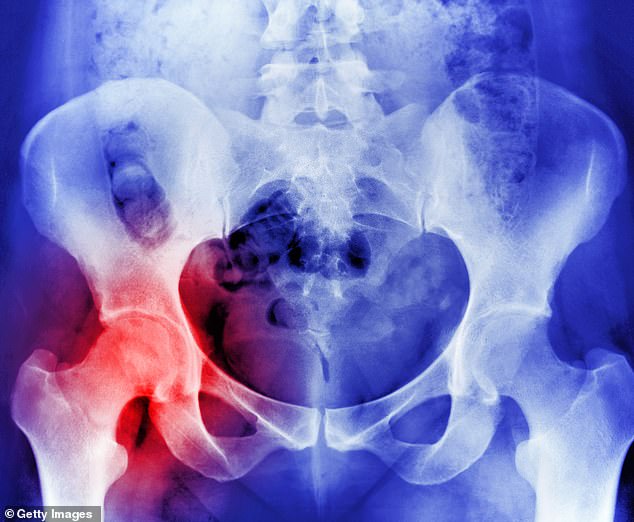Around 85,000 Britons are missing out on therapy for osteoporosis because of a ‘Wild West’ postcode lottery of care, a charity warns.
Only half of NHS trusts have a Fracture Liaison Service and many are failing to meet targets, the Royal Osteoporosis Society says.
The service is considered a gold standard of care and identifies, assesses and treats anyone who sustains a fracture after the age of 50.
But a Freedom of Information request sent to 123 trusts in England reveals only 51 per cent have one.
This compares with 100 per cent coverage in Scotland and Northern Ireland.

Only half of NHS trusts have a Fracture Liaison Service and many are failing to meet targets, the Royal Osteoporosis Society says
Osteoporosis – low bone density – affects 3.5million people in the UK but is known as a ‘silent disease’ because of under-diagnosis and treatment.
Only 14 of English trusts said they hit the national standard of identifying at least 80 per cent of qualifying patients in 2020 – down from 19 in 2019.
Further, just 30 saw at least 80 per cent of referrals within the guideline 12 weeks and a mere ten reviewed at least 80 per cent of patients on osteoporosis drugs after a year.
The pandemic has impacted care, with 79 per cent of bone scanning services operating at ‘severely reduced capacity’, the FOI reveals.
These are contributing to delays, which can allow bones to deteriorate further before treatment begins, the ROS warns.
Only 32 per cent of 3,000 patients polled for the ROS believe they are getting the level of monitoring they need – down 15 points since the last survey in 2014.
What is osteoporosis?
Osteoporosis is a disease where bone density is lost leaving patients prone to fractures. Usually, old bone tissue is broken down and replaced with new tissue.
Osteoporosis occurs when the breaking down of bone outpaces its replacement.
Bisphosphonates are clinically proven to reduce the risk of fractures by increasing bone mass and mineral density as well as filling pits created by overactive bone cells.
The drugs bind to the surface of bones, blocking bone removal.
Because longer-term treatment can sometimes have side-effects, the doctor may suggest a break from treatment after three to five years.
Advertisement
Worryingly, 38 per cent of respondents had to wait over a year after their first broken bone to get diagnosed; 28 per cent more than two years; and 17 per cent more than five years.
Craig Jones, chief executive of the ROS, wants a Fracture Liaison Service in every trust.
He said: ‘Every hour in modern Britain, people will suffer 60 broken bones due to osteoporosis – affecting mainly older people, who have already suffered so much during this pandemic.
‘The disease has a devastating personal, societal and financial impact.
‘It doesn’t need to be like this: levelling up services in the NHS can spare tens of thousands of people the long-term pain, disability and loss of independence caused by fractures, protecting quality of life as people live longer, and paying back the NHS’s investment many times over.’
Osteoporosis is easily treatable by safe, cheap and effective medication if diagnosed early, allowing patients able to live a perfectly ordinary life.
But treatable problems can escalate, with a fifth of women suffering three or more broken bones before getting a diagnosis.
As many people now die of fracture-related causes as from lung cancer, diabetes or chronic lower respiratory diseases, the ROS says.
Jan Westbury, 65, from Fordingbridge, said nobody mentioned a Fracture Liaison Service when she fractured both her arms in a fall in 2012.
She added: ‘The healthcare professionals who cared for me did not mention that I could have low bone density.
‘The post code lottery for a Fracture Liaison Service means that I and many others miss out on access to proper co-ordinated care and expert advice.’
An NHS spokesperson said: ‘Patients who need it, can and should continue to come forward for care and treatment for osteoporosis – whether that is through a Fracture Liaison Service, their GP or in other local healthcare settings.’
Source link : https://www.dailymail.co.uk/health/article-9904473/Around-85-000-Britons-missing-therapy-charity-warns.html











